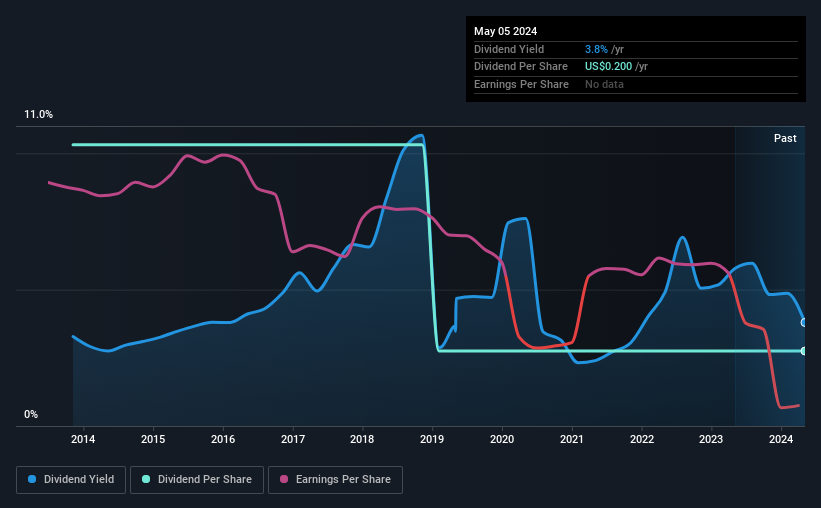Pitney Bowes (NYSE:PBI) Has Announced A Dividend Of $0.05
The board of Pitney Bowes Inc. (NYSE:PBI) has announced that it will pay a dividend of $0.05 per share on the 7th of June. This makes the dividend yield 3.8%, which will augment investor returns quite nicely.
While the dividend yield is important for income investors, it is also important to consider any large share price moves, as this will generally outweigh any gains from distributions. Investors will be pleased to see that Pitney Bowes' stock price has increased by 41% in the last 3 months, which is good for shareholders and can also explain a decrease in the dividend yield.
See our latest analysis for Pitney Bowes
Pitney Bowes' Payment Has Solid Earnings Coverage
A big dividend yield for a few years doesn't mean much if it can't be sustained. Pitney Bowes isn't generating any profits, and it is paying out a very high proportion of the cash it is earning. These payout levels would generally be quite difficult to keep up.
The next year is set to see EPS grow by 163.0%. If the dividend continues along recent trends, we estimate the payout ratio will be 12%, which is in the range that makes us comfortable with the sustainability of the dividend.
Dividend Volatility
The company's dividend history has been marked by instability, with at least one cut in the last 10 years. The annual payment during the last 10 years was $0.75 in 2014, and the most recent fiscal year payment was $0.20. The dividend has fallen 73% over that period. Declining dividends isn't generally what we look for as they can indicate that the company is running into some challenges.
The Dividend Has Limited Growth Potential
Given that the track record hasn't been stellar, we really want to see earnings per share growing over time. Over the past five years, it looks as though Pitney Bowes' EPS has declined at around 39% a year. A sharp decline in earnings per share is not great from from a dividend perspective. Even conservative payout ratios can come under pressure if earnings fall far enough. Over the next year, however, earnings are actually predicted to rise, but we would still be cautious until a track record of earnings growth can be built.
We're Not Big Fans Of Pitney Bowes' Dividend
Overall, while some might be pleased that the dividend wasn't cut, we think this may help Pitney Bowes make more consistent payments in the future. The company isn't making enough to be paying as much as it is, and the other factors don't look particularly promising either. Considering all of these factors, we wouldn't rely on this dividend if we wanted to live on the income.
Companies possessing a stable dividend policy will likely enjoy greater investor interest than those suffering from a more inconsistent approach. At the same time, there are other factors our readers should be conscious of before pouring capital into a stock. For example, we've picked out 2 warning signs for Pitney Bowes that investors should know about before committing capital to this stock. Looking for more high-yielding dividend ideas? Try our collection of strong dividend payers.
Have feedback on this article? Concerned about the content? Get in touch with us directly. Alternatively, email editorial-team (at) simplywallst.com.
This article by Simply Wall St is general in nature. We provide commentary based on historical data and analyst forecasts only using an unbiased methodology and our articles are not intended to be financial advice. It does not constitute a recommendation to buy or sell any stock, and does not take account of your objectives, or your financial situation. We aim to bring you long-term focused analysis driven by fundamental data. Note that our analysis may not factor in the latest price-sensitive company announcements or qualitative material. Simply Wall St has no position in any stocks mentioned.

 Yahoo Finance
Yahoo Finance 
